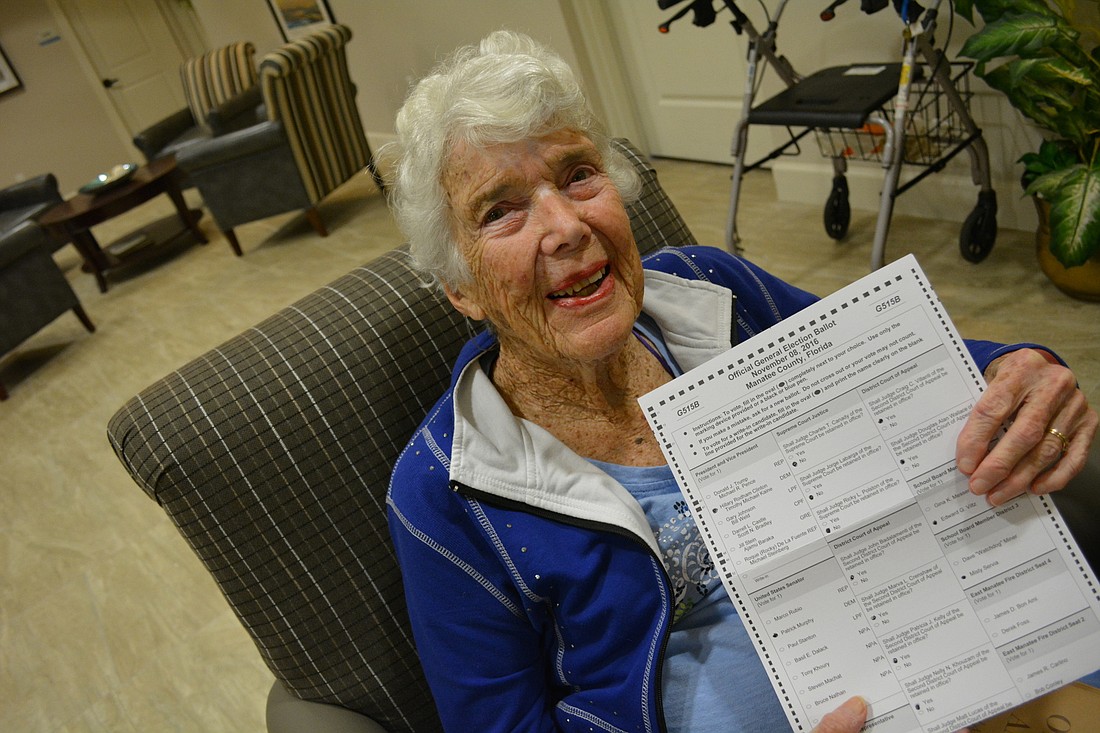- April 25, 2024
-
-
Loading

Loading

At 95 years old, Lakewood Ranch’s Miriam Hosack never thought she would see the day.
But on Oct. 27, Hosack filled out her absentee ballot (she isn’t mobile enough to vote in person), and had an opportunity for the first time in her life to cast a vote for a woman who carried a major party’s nomination into the presidential election.
With her daughters by her side, Hosack did, indeed, vote for Hillary Clinton.
“I never thought a woman would have a chance to run for president,” said Hosack, who was born Dec. 23, 1920, the same year the 19th Amendment, securing a woman’s right to vote, was ratified. “It seems impossible. The way I grew up as a young person, nobody ever looked at women like that. We followed after the men.”
Hosack, now a resident of Inspired Living at Lakewood Ranch, wasn’t a political activist, per se, but her life story was one that promoted politics and the advancement of women.
Her education level — she obtained a master’s degree from San Francisco State University — exceeded that of her husband, the late Robert Hosack, a Republican and a World War II veteran who never went to college.
In an era when women seldom worked outside the home, or did so to provide supplemental income for their families, Miriam Hosack returned to college to earn her master’s degree in education while raising three children, University Park’s Karen Curlin, Tallahasee’s Marsha Hosack and their brother, Ron Hosack, who lives in California.
“Mom had a career,” said Curlin. “It showed mom was a strong, independent woman. She was an avid reader and kept up on events.”
Miriam and Robert Hosack made politics a center of dinnertime conversation. At one point, they required their children to read up on current events and be prepared to talk about them at mealtime.
“My dad enjoyed a good debate,” Curlin said. “He would instigate conversations. They would, in good humor, say how they split the ticket and canceled each other’s vote.”
Curlin and Marsha Hosack have shared their mother’s enthusiasm with support of women’s rights over the years.
Both daughters adopted some of their mom’s beliefs. “I feel women have to work extra hard to get the same raises, recognition and promotions,” Curlin said. “It’s still a man’s network.”
The sisters knew they would go to college, even though it wasn’t yet the norm for women.
Marsha Hosack considered herself the “political activist of the family” when she attended college, although her mother was the person who told her about the Equal Rights Amendment, a proposed amendment to the U.S. Constitution that civil rights could not be denied based on one’s sex and still has not been passed to date.
“Mom was the one who told me what the Equal Rights Amendment was,” Marsha Hosack said. “She brought me a bracelet that said, ‘ERA.’ I still have the bracelet.”
Miriam Hosack’s memory has begun to fail, but she understands women have advanced and believes they should continue to do so.
Although she can’t get out to vote anymore, participating in the process is a responsibility she relishes.
“We need to keep in touch with what’s going on around us,” Miriam Hosack said.